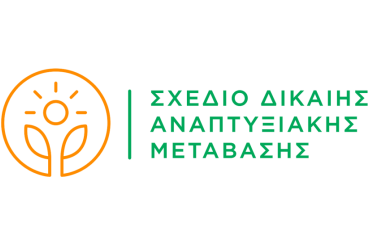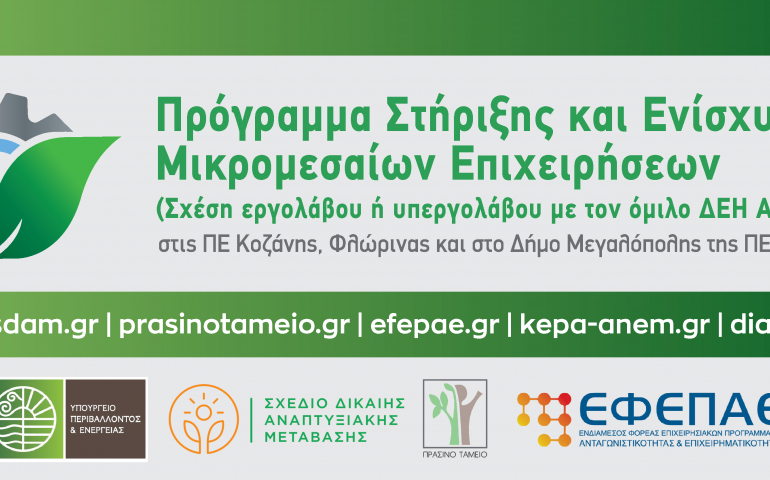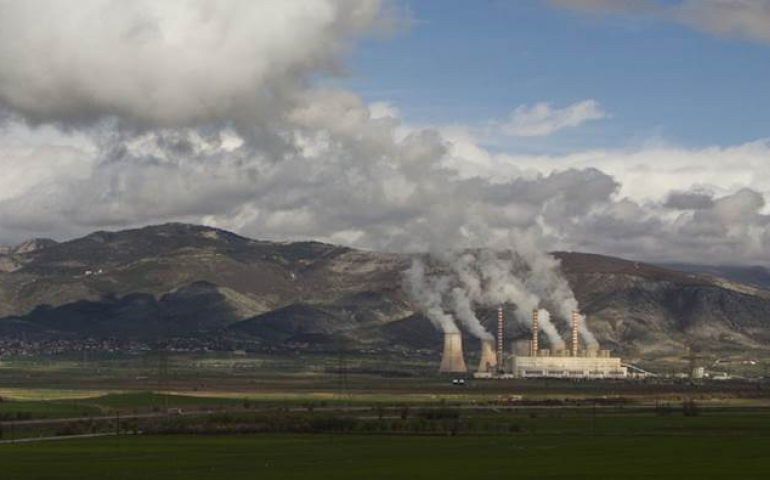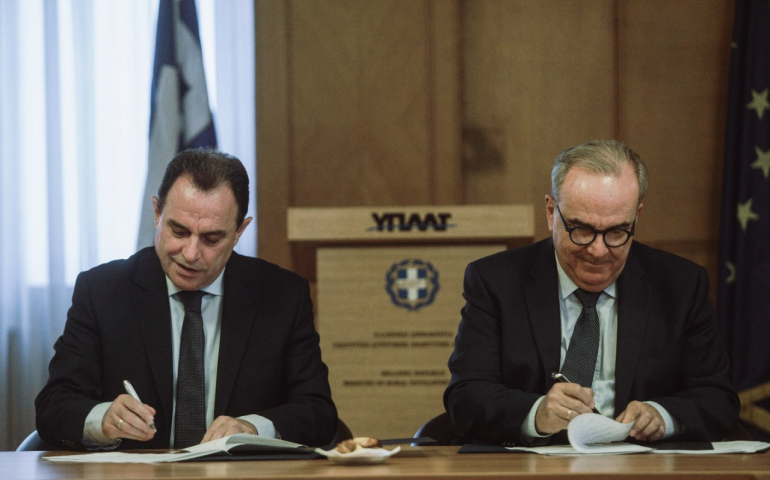OPEN CALL for submission from non-public entities of NON-BINDING INVESTMENT PROPOSALS AND DEVELOPMENT PLANS in the context of the Just Development Transition Plan
STEERING COMMITTEE Athens, 09.07.2020
JUST TRANSITION DEVELOPMENT Protocol No. : 13
PLAN
Address: Korai 4, 5th floor, Wing B, 10564 ATHENS
Information:
Tel.: 210 3278148
E-mail: sdam@sdam.gr
OPEN CALL
for submission from non-public entities of
NON-BINDING INVESTMENT PROPOSALS AND DEVELOPMENT PLANS
in the context of the Just Development Transition Plan
Preface
The goal of the complete lignite phase-out of the country until 2028 is reflected on the National Energy and Climate Plan (NECP, Government Gazette Β΄4893 / 31-12-2019), that ensures the stability of the electricity system and the country's energy supply security. The lignite phase-out is part of the European Strategy for the transition to a climate-neutral Union, providing - among others - the zeroing of greenhouse gas emissions (GGE) by 2050 (Green Agreement, COM (2019) 640 of the 11.12.2019).
The goal of climate neutrality has a wider impact on areas that are heavily dependent on fossil fuels or GGE intensive industries. Therefore, the radical restructuring of those local economies must ensure that the new activities developed in those areas, should not only maintain but also bolster the economic and social structure, in order for the transition to be fair and socially viable. To that aim, in the framework of the new Cohesion Policy and based on both the "Green Agreement" and the "Sustainable Europe" investment plan (COM (2020) 21 of the 14.1.2020), a "Just Transition Mechanism" (JTM) was established.
The JTM will be complementary to the other EU budget actions for the next 2021-2027 planning period (Multiannual Financial Framework, MFF), aiming to provide targeted support to attract investments in areas with high-employment on fossil fuel production, as well as in areas with industries with high GGE, whose operation will be either interrupted or severely affected by the transition to climate neutrality.
The JTM consists of three pillars: the Just Transit Fund (JTF), the Special InvestEU Status Regime, and the Trade Finance Facility of the European Investment Bank (EIB). The 2021-2027 JTF will finance investments in the aim of (a) economic diversification and (b) the transformation of economy sectors of the regions in transition, provided that these investments are approved as part of Territorial Just Transition Plans (JFTP) and are necessary for their implementation.
Given the above, a Just Development Transition Plan (JDTP) has been devised, aiming for “the holistic developmental restructuring of the lignite areas of the country, by the creation of strategic possibilities for the preservation and reinforcement of the social fabric.”
- The submission framework of Investment Proposals and Development Plans
According to the no. 3 / 18-3-2020 decision of the Government Commission for the just development transition of the Region of Western Macedonia and the Municipality of Megalopolis in the Region of Peloponnese in the lignite phase-out period, a Special Transition Program for the period of 2020-2023 is drawn up, utilizing the resources of both ESPA 2014-2020 and those of the Green Fund, as formed by the Ministerial Decisions for the distribution of revenues from auctions of greenhouse gas emission rights.
In implementation of the same decision in the Transitional Program 2021-2023 and, until the activation of the new Operational Program for the Fair Development Transition 2021-2027 (OP FDM), priority projects and actions will be included, for the accomplishment of the just and sustainable transition of the particular areas.
Simultaneously, in consideration of the application of the JDTP, there is a high investment and business interest from local and foreign private entities, which is translated into a non-methodical investment and developmental proposal submission.
In order for the planning and procurement of effective interferences, in the context of the JDTP and given the following:
- the provisions of Act of the Council of Ministers 52 of the 23-12-2019 (Government Gazette Α΄ 213), "Establishment, formation and operation of a Government Committee for the Fair Development Transition of the Region of Western Macedonia and the Municipality of Megalopolis in the post lignite phase-out period",
- the no. 1/2020 Decision of the Government Committee for the Fair Development Transition of the Region of Western Macedonia and the Municipality of Megalopolis in the post phase-lignite out period (ADA: Ψ1ΩΕ4653Π8-ΓΚΓ) regarding the establishment of FDTP Coordinator and Chairman of the Coordinating Committee (CC) and,
- the establishment and formation/operation of the Technical Committee for the Just Development Transition Plan (TCJDTP) from 21.05.2020. and
- the particular requirements and providences of the JTM plan and more specifically the particularities of the actions of the Regulation of the Fund for Just Transition plan.
The Steering Committee publishes the open call hereunto, of the organized submission of investment proposals and developmental plans.
The investment proposals and development plans that will be taken into account by the Steering Committee of the Just Development Transition Plan, will be of non-binding character, both for the Economic Entities interested and for the Steering Committee and the responsible Public Entities.
The investment proposals and development plans will be submitted by the financial and investment entities exclusively electronically at te@sdam.gr, by filling out a standardized and confidential "Technical Proposal Datasheet – TPD” (www.sdam.gr). Documents and studies can be attached to each TPD, according to the TPD instructions.
- Evaluation of Plans and Proposals – Results
The process of submission and pre-evaluation of the investment proposals and development plans will be performed with the systematic cooperation among the financial and investment bodies in sectors of mutual interest in a fair and competitive environment and the appropriate, timely and sustainable preparation of the private and public sector, in areas where this is also necessary, depending on the pre-market sounding requirements.
Any positive response of the Coordinating Committee to the submitted proposals does not translate to the approval or acceptance of funding of any Proposal or Plan.
Proposals and Plans, as far as the acceptance of funding or the adoption of regulatory or other initiatives by the State are concerned, shall be subject to the occasional procedures regarding publicity, transparency and competition, as well as to the satisfaction of competition and the individual criteria and conditions governing the competent Authority, Body or Service or the investment’s financial source.
The Coordinating Committee will put the investment proposals and development plans submitted into consideration of the Technical Committee (TCFDTP), who will also proceed to their pre-evaluation approach (preliminary evaluation of proposals and plans, forming of opinions and recommendations etc.), according to its operating regulations. The pre-evaluation criteria of the investment proposals and the development plans are presented in the Appendix, provided below.
It should be mentioned that the TCJDTP assumes an advisory, technical and supportive role to the Steering Committee, especially in relation to investment proposals and development plans that are taken under its consideration. As for the accomplishment of its mission, the TCJDTP will cooperate on a case by case basis with other government bodies as well as with the relevant European Commission services.
The results of the pre-evaluation process will be confidentially communicated to the Financial and/ or Investment Bodies and, will contain scientific, technical and procedural views and recommendations for the improvement and/ or the completion and/ or the adjustment of investment proposals and development plans.
The submission of investment proposals and development plans is not subject to time commitments and ‘individual’ stages. The pre-evaluation process will follow a “first in first out” basis. Some clarifications and additional information may also be required by the TCJDTP, in the working meetings. The results of the pre-evaluation process will be provided to the involved Financial and/ or Investment Entity.
APPPENDIX:
Pre-Evaluation Criteria of Investment Proposals and Development Plans
- Project Maturity
- Feasibility Study
- Stage of authorization process
- Project management / ownership
- Credibility of investment body
- Business Status
- Technical credibility – experience
- Financial Rating/ Capacity
- Issues of legitimacy and competition
- Financial Feasibility of investment
- Net present value of cash-flows
- Credit Profile
- Business Risks
- Assumptions and pre-requisites for the amount of subsidies and guarantees
- Assumptions and pre-requisites for market penetration
- Assumptions and pre-requisites for natural resource usage (land, environment, waters, etc.)
- Assumptions and pre-requisites for infrastructures
- Timeframe gradation?
- Short-term, for the direct socio-economic impacts from the closure of the lignite plants (based on the number of lost jobs)
- Mid-term, for the economic restructuring through the attraction of investments
- Mid-Long-term, for the attraction of large investments
- Compliance with the development plan as well as the financial, energy and environmental policies
- Compliance with individual areas master plans
- Compliance with fiscal policy
- Compliance with security issues
- Compliance with energy and climate policy
- Compliance with environmental policies
- Developmental – qualitative benefits for the area
- Creation of new job positions
- Investment leverage of area
- Added value leverage of area
- Labor force relocation incentives for the area
- Synergies with other financial activities, industries and investments
- Compatibility with the specializations and capabilities of local labor force
- Compatibility with the specializations and capabilities of local businesses
- Compatibility and benefits of the current local infrastructure, including energy infrastructures
- Indirect demotivation with other future activities and incentives
- Positive and negative impacts focused on low income households, unemployed and small businesses
- Greater impacts on the economy, employment and investments
- Reinforcement of industry and business synergies
- Non-renewable energy usage
- Usage and capitalization of land
- Energy – Efficiency, competitive use of resources for energy purposes
- Antithesis – Incompatibility (or demotivation) with other future activities and incentives
- Water resource usage issues
- Agricultural and forest land usage issues
- Gas emissions issues
- Environmental reclamation around coal plants issues
- Conflicts and competition of proposals
- Use of previously granted subsidies or funding (allocations)
- Conflict or overlap of market or industry
- Conflict for non-renewable resources






